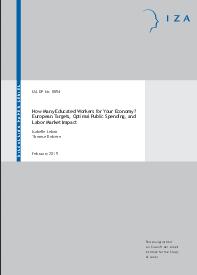Basse, T. (2015) “Searching for the EMU core member countries“, European Journal of Political Economy, Vol. 34, Supplement, Ιούνιος 2014, pp. S32–S39. This study uses techniques of cointegration analysis and tests for structural change to search for changes to sovereign credit risk in some relevant member states of the European Monetary Union (EMU) trying to identify core countries. While there are a number of core countries the empirical findings …Read More
Austerity and recovery: East Asian lessons for Europe
Chari, Α. & Blair Henry, Ρ. (2015) “Austerity and recovery: East Asian lessons for Europe“, VoxEU Organisation, 06 Μαρτίου. In the wake of the Great Recession, a contentious debate has erupted over whether austerity is helpful or harmful for economic growth. This column compares the experiences of the East Asian countries – whose leaders responded to the East Asian financial crisis with expansionary fiscal policy – with those of …Read More
Macroprudential spillovers: The role of organisational structure
Danisewicz, Ρ., Reinhardt, D. & Sowerbutts, R. (2015) “Macroprudential spillovers: The role of organisational structure“, VoxEU Organisation, 05 Μαρτίου. In a global financial system, macroprudential policies may create international spillovers. This column presents new evidence on how the organisational structure of a bank affects the magnitude of these spillovers. An increase in capital requirements at home causes foreign branches to reduce their lending growth to other banks operating in …Read More
How Many Educated Workers for Your Economy? European Targets, Optimal Public Spending, and Labor Market Impact
Lebon, Ι. & Rebière, Τ. (2015) “How Many Educated Workers for Your Economy? European Targets, Optimal Public Spending, and Labor Market Impact“, IZA DP No. 8854, Φεβρουάριος. This paper studies optimal taxation schemes for education in a search-matching model where the labor market is divided between a high-skill and a low-skill sector. Two public policy targets –maximizing the global employment level and optimizing the social surplus– are studied according …Read More
What does it really mean to be ‘pro-business’?
Ha-Joon Chang (2015) “What does it really mean to be ‘pro-business’?“, The Guardian, 03 Μαρτίου. Despite the best efforts of some of its members to discredit it with market rigging, tax avoidance, and unjustified bonuses, the business community is still held in awe in Britain. Any suggestion of higher taxes for top earners or tougher regulations on the abuse of market power is howled down as dangerously anti-business. Politicians …Read More
A Global Projection Model for Euro Area Large Economies
Jakab, Ζ., Lukyantsau, Ρ. & Wang, S. (2015) “A Global Projection Model for Euro Area Large Economies“, IMF Publications, Working Paper No. 15/50 The GPM project is designed to improve the toolkit for studying both own-country and cross-country linkages. This paper creates a special version of GPM that includes the four largest Euro Area (EA) countries. The EA countries are more vulnerable to domestic and external demand shocks because …Read More
Corporate Taxation in Europe: Let’s get it together!
De Groen, P. W. (2015) “Corporate Taxation in Europe: Let’s get it together!“, Financial Markets, CEPS Commentaries, 16 Φεβρουαρίου More comprehensive cooperation in corporate taxation at European level could significantly advance the region’s socio-economic prosperity, but its potential contribution is unfortunately overlooked in the current search for growth and job creation. Lucrative tax niches established in some member states and the fear of losing fiscal autonomy prevent several countries from …Read More
Capital taxation in the 21st century
Auerbach, J. A. & Hassett, K. (2015) “Capital taxation in the 21st century“, VoxEU Organisation, 03 Μαρτίου. Piketty’s justification for his proposed wealth tax relies on the notion that the rate of return on capital exceeds economic growth. This column challenges this basis, arguing that it fails to account for risk. The authors also examine the relative merits of a consumption tax, which may be more valid. In Capital …Read More
Politics and investment: Examining the territorial allocation of public investment in Greece
Rodríguez-Pose, Α., Psycharis, Υ. & Tselios, V. (2015) “Politics and investment: Examining the territorial allocation of public investment in Greece“, VoxEU Organisation, 03 Μαρτίου. Electoral results and the geographical allocation of public investment in Greece have been intimately related. This column describes how incumbent Greek governments between 1975 and 2009 tended to reward those constituencies returning them to office. Increases in both the absolute and relative electoral returns for …Read More
The critical junction – Unless Germany charts a new business course, it will lose out to the rest of the world economy
Görlach, Α. (2015) “The critical junction – Unless Germany charts a new business course, it will lose out to the rest of the world economy“, The European Magazine, 02 Μαρτίου. Sigmar Gabriel lives in the 19th century. For the German Minister for Economic Affairs, the list of what matters isn’t long: industry, German cars and so forth. Digital innovation? New business models? Not for him. He is, rather, stirring …Read More





